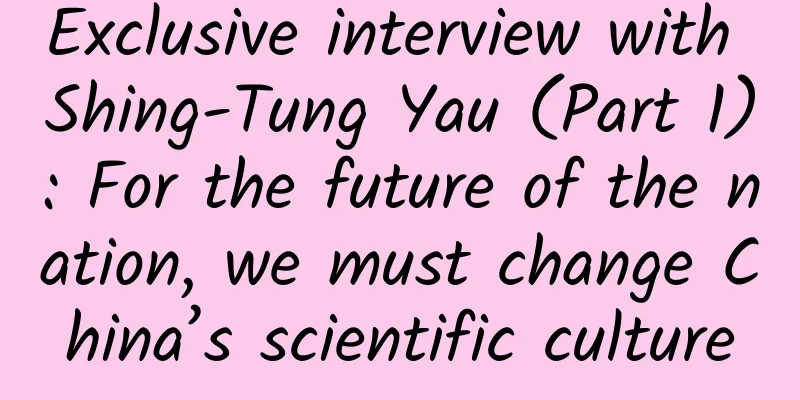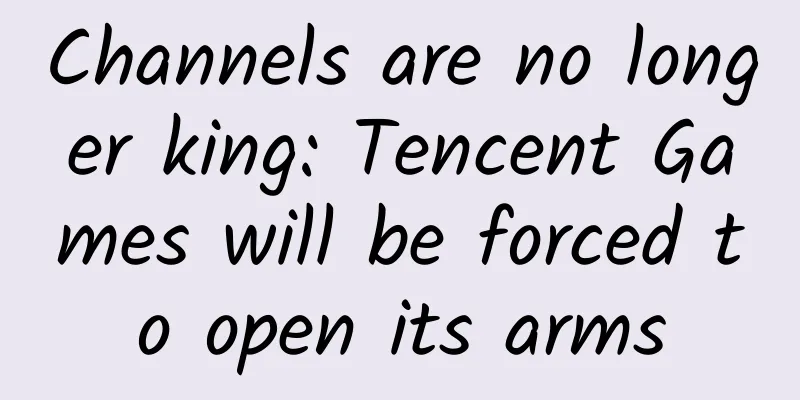Exclusive interview with Shing-Tung Yau (Part 1): For the future of the nation, we must change China’s scientific culture

|
Earlier this year, Professor Shing-Tung Yau, an internationally renowned mathematician, director of the Center for Mathematical Sciences at Tsinghua University, and dean of the Qiuzhen Academy at Tsinghua University, was a guest at an online live event titled "My Father and I: Talking about Mr. Qiu Zhenying's Lectures on the History of Philosophy" hosted by Tsinghua University Library and CITIC Press. Professor Lou Yuqing of the Department of Physics at Tsinghua University interviewed Mr. Yau during the event. In the first part of this interview, Professor Qiu Chengtong talked about how his father, Mr. Qiu Zhenying, passed away when he was 14 years old, but profoundly shaped his lifelong learning and teaching, and ultimately influenced his career. He also introduced in detail the concepts, practices and some valuable details of the education of mathematical leaders that he is trying to promote. In the interview lasting more than an hour, we can clearly feel the sincerity and ambition of this scholar who is over 70 years old to improve the level of mathematics education in China. In the next article, Mr. Qiu introduced to the academic community some of his important work in theoretical physics and applied mathematics, and shared some unique views on mathematics and physics. This article is a re-edited transcript of the interview, which was published with the authorization of Mr. Qiu Chengtong, in order to make it easier for readers to understand the key points of the interview. We re-arranged the order of questions and answers based on the live broadcast and removed the trivialities of oral communication. After the interview, Mr. Qiu also answered questions from the audience online, which can be found in "What Qiu Chengtong said to young people". Media that have obtained the long-term whitelist reprint authorization of "Fanpu" and wish to reprint this article, please apply separately and wait for authorization. Note: This live broadcast includes 4 videos, including Mr. Qiu's introduction to Mr. Qiu Zhenying's Lectures on the History of Philosophy, an interview with Professor Lou Yuqing, and Mr. Qiu's answers to readers' questions. Each part has a different focus. Interested readers can also watch the original video in the collection of the "Fanpu" video account "Live Interview with Mr. Qiu Chengtong". Compiled by Tan Ying and Xiao Ye How my father influenced my career for half my life Lou Yuqing: Thank you Mr. Qiu for accepting our special interview. I have heard your speeches on different occasions and I can see that you have a very deep foundation in Chinese. Is this due to your own interest or the influence of your father, or the influence of your family environment or even school education? You went to the United States to study and research mathematics after your sophomore year. Have you always maintained your interest in Chinese poetry and history and culture? Qiu Chengtong: I have always loved mathematics. Starting from mathematics, I have a great interest in physics and other subjects, so I have also done some relatively important work in physics. When doing mathematics and physics, I like to have a macro perspective, not just a small topic or a small direction. I believe that all important disciplines have achieved truly significant developments because of the sparks created by the collision of different viewpoints. This is very important to me. This is also a view I learned from my father. He taught me poetry, classical literature, and philosophy. Philosophy does not only talk about Chinese philosophy. His interest is Chinese philosophy, but he believes that Chinese philosophy should be compared with Western philosophy, starting from Greek philosophy, all the way to Kant, to Marx. In addition, we must also consider Indian Buddhism, which has a very important influence in China. During the Eastern Han Dynasty, Buddhism was introduced to China, all the way to the Wei, Jin, Southern and Northern Dynasties, and also influenced the Neo-Confucianism of the Song and Ming Dynasties. These are all very important. These views have a considerable influence on me. I have always felt that a subject should be viewed from different directions, not only from what is happening now, but also from the classics to the present. For each subject, we must see the source and know where the source comes from before we know its future trend. These views are very important to me. Of course, we also have to read history. My father taught me history. Many important historical events can often help a scholar learn how to move forward in order to achieve the best goal. There are often many difficulties in doing research, and sometimes you may not be able to go on. The issue of choice is very important. Should we persist in doing it? Many scholars have just reached the final step, but they cannot go in, and they cannot persist because they do not see clearly; some scholars persist and do it. These practices are actually related to many important decisions in history. Some people make the wrong decision at the last minute, and they are completely wrong, while some people make the right decision and complete it. This is very similar to our research. When we do a big study, we often rely on self-confidence and the ability to appreciate knowledge . Whether we can persist or not is closely related to our cultivation. Many students, especially Chinese students, have spent three or four years without solving this problem. They feel that there is no future, so they give up. However, often when you are about to give up, you have actually taken the wrong path. I have noticed the importance of these issues in my life, and it has had a great impact on me. I made several important decisions when I was young. The time when my father passed away was the most important turning point in my life. My father passed away when I was 14 years old. At that time, I was in the third grade of junior high school. I was faced with the question of whether to continue studying. When my father passed away, there were eight brothers and sisters in the family. My mother was the only one left to raise so many children. It was very hard. Whether I should continue to study became an important question. At that time, my mother supported me to continue studying. If I decided that life was more important than study, I would not be able to study. This was my first very important decision: not only to continue studying, but also to study well. When I was a child, I knew very well that my father wanted me to study. I believed in my father and had the confidence to continue studying. But it was not easy to make this decision. The family was very hard and needed my care. Later, there were several more important decisions. One of them was whether to go abroad after college or stay in Hong Kong. When I graduated from high school, the National Taiwan University expected me to study there. The mathematics in Taiwan was better than that in Hong Kong, but I did not go to Taiwan but stayed in Hong Kong. These decisions have a great impact on my life. You can also say that I am very lucky. Basically, every decision I make is a good decision for me. If you take a wrong step, you may end up in the completely wrong place, and your life will be completely changed. These several important and correct decisions are at least closely related to my father’s teachings and his training and views on my history. Lou Yuqing: Your father wanted you to study. Does that mean he had seen that you had a certain talent in mathematics, or did he just generally think that you should study? Qiu Chengtong: My father started to teach me to study when I was 11 or 12 years old. He taught me general knowledge, such as literature, history, and philosophy. My father did not understand mathematics, but he could see that I had some talent in mathematics. My father passed away when I was 14 years old, and he had no time to guide me in the direction of my studies. I knew very well that he not only expected me to study, but also to do good studies, and that these studies would have an impact and be passed down. I always remember my father's encouragement to me. Although he did not say it directly, from his words, deeds, and teachings, I knew that this was his expectation, and he had high expectations of me. My mother also knew my father's expectations of me, and she followed my father's way in many things. Although life was very hard, she still supported me to continue studying, which was closely related to this. My father's teachings, including his literary teachings, had a great influence on me, allowing me to look at things from a different perspective, which was also a very important cultural improvement. I would not be satisfied with a good life, but I hope I can do something great. I had this view very early on. Improving China's scientific culture must start from junior high school Lou Yuqing: Most people usually feel that mathematics is difficult, profound and abstract, although there is a difference between pure mathematics and applied mathematics. The Chinese nation has a large population, and there are a certain number of people with special talents in proportion. You are now working hard to popularize mathematics education and select outstanding talents. How do you think China can encourage and promote these young people to develop their talents and make outstanding contributions in mathematics? Qiu Chengtong: China now needs scientific culture as a foundation, but of course there are many other problems. We see some children who are somewhat interested in science, but they do not receive encouragement from their parents and teachers. What they encourage is high scores in the college entrance examination and the Mathematical Olympiad. This kind of encouragement makes children lose interest in the mysteries of nature, and this point needs to be overcome. To be honest, we can only start from junior high school if we want to improve China's scientific culture. So I am very interested in junior high school students now. Because of the college entrance examination, most high school students have to spend a lot of time preparing, almost the entire year of their senior year. There is a junior high school entrance examination when you graduate from junior high school, and junior high school students also spend most of their junior year preparing. This is a very worrying phenomenon. Spending a whole year preparing for the exam not only makes children fall into mechanical learning, but also slowly erodes their original interest. The most important thing is that children will think that the most important thing in their lives is the exam , and there is nothing else important. This is very unfortunate. What I want to do now is to change this culture so that at least a small part, such as one thousandth of the population, can change. There are 10 million people taking the college entrance examination every year, and one thousandth is not a small number, or even one ten thousandth is also very good. Cultivating some scientists or scholars with a deep cultural background can change China's future. We must change China's scientific culture and let children have a strong interest in science, so that we can change the fate of China's scientific and technological development. Lou Yuqing: You have opened a special math training class at Tsinghua University. The youngest students are middle school students, who may be only 13 or 14 years old. I remember that when I talked to you before, you were very ambitious and hoped that some of them would win the Fields Medal in the future. So how do you select them? What is the general training plan and training steps? They are still quite young children. You personally teach them and introduce them to cutting-edge problems in mathematics when appropriate. Do you also ask them to pay attention to other different subjects, such as physics? Qiu Chengtong: We attach great importance to educating children to understand different subjects and become generalists. Our class is called the "Leadership Class". The leadership class focuses on both mathematics and physics . During the exam, students must do well in mathematics and physics. Basically, their mathematics and physics abilities must reach the level of a first-year college student. This is the rule of our exams. We require students to be good at not only mathematics and physics, but also to be able to accept other subjects , such as Chinese literature, foreign literature and other subjects. Qiuzhen Academy has three important plenary lectures every week. One is that I give a one-and-a-half-hour lecture on the history of mathematics on Monday night. Why do I give a lecture on the history of mathematics? Because in China, some Chinese mathematicians are working in a very narrow direction and are not grand enough. The reason is that they don't know much about the trends of mathematics and the development of ancient and modern times, both at home and abroad, and lack the practice of cultivating generalists, so I give them more than an hour of mathematics history every week. Basically, I talked about the history of ancient Greece to the 18th and 19th centuries. This week (editor's note: refers to the end of 2022) I talked about mathematicians in the 19th century, and I am going to talk about mathematicians in the 20th century. So far, I have basically talked about the history of 33 mathematicians. This history is very important for children. They will know how the world's good mathematicians are cultivated and how to find their own way. They have different learning methods and different growth processes. What are their views, methods and attitudes for doing research? These are all very important. Generally speaking, our students cannot understand these. Sometimes it is difficult for students who have just come, but I stipulate that they must listen. I talk about easy things, and they are very interested. However, they cannot just learn easy things, some things are necessary. I cannot talk about superficial history, I have to talk about some history with content. They must know these things, and they can learn other things slowly. At least a seed is planted in their minds to know how scholars with knowledge were born in the past. They don’t know how to do research themselves, so they have to learn from the experiences of great mathematicians how to take this path. When we look for these students, we spend a lot of effort to select them and train them well. We start looking for these students from junior high school, hoping that they can grow. But children are always young, and they may be mature in some knowledge, but not in other aspects. We have to improve slowly, but we have to develop these cognitions from the beginning. Just now you asked about enrollment, which is an important question. The Leader Program recruits 100 students every year without taking the college entrance examination. Many parents think that not having to take the college entrance examination is a great thing, but they are mistaken. We want to recruit students who are very interested in studying mathematics, not students who do not have to take the college entrance examination. Some parents may think that after entering Qiuzhen College, they can transfer to the School of Economics and Management, because studying finance in the School of Economics and Management is what they are most interested in. But we do not allow students to transfer to study finance and economics after entering. We made it clear to parents and children at the beginning that the purpose of coming to Qiuzhen Academy is to study mathematics. After learning mathematics, I don’t care whether you want to study economics, but at least you must lay a good foundation. This is a very important thing. I myself have about 10 students studying mathematics with me every week, the most cutting-edge mathematics. I teach them. Although they are only 17 or 18 years old, the content they study is actually the same as Harvard graduate students, so they have no problem and can start doing research. We say that the best students can do this, but some of them are not at a good level when they come in, and they still need to be trained. I think as long as you put in the effort, you can train them well. But there is a problem in China now. In my opinion, teachers are afraid of students, and universities are afraid of teachers. They don’t want anything to happen. For example, if I want to require them to study the history of mathematics, they will think that other schools don’t have it, so why should I study it? I don’t want to study it. Others don’t study it, but I want them to study it, and they will feel unhappy. Children always like to play, and they feel that they don’t have enough time to play. Lou Yuqing: When you taught the history of mathematics, you told students many stories of failures or successes of famous mathematicians. This is very important for mathematics education, and similar stories are also very important in physics. Can you tell us more about the opportunities in the research process and how people seized them at that moment? Qiu Chengtong: In the history of mathematics, starting from the great Archimedes, everyone has a different attitude towards learning, and everyone has his own strengths. Descartes, Leibniz or Newton all have their own strengths. I think it is very important to express the real life of a good mathematician and their views . Now the mathematicians or scholars of other disciplines portrayed in the media are almost flawless, and every scholar is perfect. In fact, perfect scholars do not exist. For example, Leibniz quarreled with Newton and it was a mess. This is a story that everyone knows. Newton is the greatest scholar in history, but he quarreled with two important people, Leibniz and Hooke. It is possible that Newton was not very fair to them, but Newton was still great, and no one can deny this. Gauss also quarreled with others. Gauss had many unpublished studies, but others did it, and Gauss said that he found it first. There are all kinds of situations. For mathematicians with flesh and blood, we need to know their views, which does not mean that I agree with their views. But every student should know that this is human nature, and we don’t need to avoid it. One thing is very important: every great mathematician has a great passion for mathematics itself , which is inevitable. Generally speaking, it is very important to cultivate his mathematical ability from the age of thirteen or fourteen. Just like our children now, when they just reach this age, we should enhance their enthusiasm for mathematics. Second, if we look at all mathematicians in history, they all had contact with some great mathematicians, whether they had contact with them at the beginning or not, they had contact with them later. Even Abel was like this. He was born in poverty, and the reason he was able to succeed later was because he went to Paris and had contact with several great mathematicians. I want students to know that you have to contact great scholars, have some contact with them, and understand their works. There is no scholar who does not stand on the shoulders of giants to move forward . If students don’t know this, it will be very troublesome. Students must read famous works and look at the methods used by predecessors. My teaching of the history of mathematics is closely related to this. You may not understand the content, but you will know a different overall atmosphere. Think about it, if you grow up in an environment where there are 33 mathematicians next to you, and you interact with them every day and communicate with them through history, your realm will gradually improve, you will see much further, and you will not be so fussy about small problems. Because when you reach that realm, you don’t care about these small things at all. You want to pursue a higher and more meaningful realm. We must bring students to such a realm, so that they can find a way out. The same is true for physics. Maxwell was great. He had a great interest in electromagnetism from the beginning. I may talk about Boltzmann next week. He was very interested in statistical physics. Every great scholar has different growth experiences. Some people live in pain, while some are born into aristocrats. Each of them has a different growth experience. We must be able to understand what they think in their hearts. For example, Galois committed suicide in his 20s. According to my understanding, he did not die for love as most people say. It was the French Revolution that aroused his many repressed emotions, and finally decided to die. Abel, who I just talked about, also did a lot on Galois's work and died at the age of 26. They are all great mathematicians. Today we need to know what paths they took when they were young and why their ideas can still have an impact today. They had a very far-sighted vision, and we students need to be able to understand this. How young talents can surpass their predecessors Lou Yuqing: I remember you mentioned that when you were studying at Berkeley, there was a professor named Charles Morrey who gave a lecture. At the end of the lecture, it seemed like you were the only one left, right? But he still prepared his lectures very seriously. Yau: Yes, Charles Morrey was a great mathematician. At that time, there were several great scholars besides Mr. Chen at Berkeley, one of whom was Charles Morrey and the other was Stephan Smale. Smale taught topology, and Charles Morrey taught nonlinear partial differential equations. When I followed him, I had no idea what kind of scholar he was, but the more I listened to his lectures, the more interesting they became. He was a Harvard graduate and the greatest scholar in the field of nonlinear elliptic equations, and he had done a lot of important work. I gradually learned from him, and the more I learned, the more I admired him. He basically had no students, but I followed him very closely, because as you just said, in the end, I was the only student left in his class. Even so, he still spent time preparing and took me to the Berkeley library to find books and references. He was very good to me, and I admired him very much. He was really a great scholar. He originally wanted me to be his student. He had never had a student in his life, and he expected me to be his student, but at that time I had already decided to study under Mr. Chen, so it was difficult to change. Otherwise, I might have been his student, because I admired him very much, and his knowledge also influenced my knowledge, and it influenced my knowledge for a lifetime. Lou Yuqing: For a great school like Berkeley and such a great scholar to have no students in his entire life, would his colleagues have any comments? Yau: There are so many professors at Berkeley. Some of them are good at speaking, and some of them teach easy things. Students are willing to learn those things that are easy to learn. Charles Morrey is a very old-fashioned scholar. He usually wears a tie in class, which is out of place at Berkeley. The campus atmosphere at Berkeley is very hippie and loose, and he is an old-fashioned professor from Harvard University. In terms of life, students don’t like this kind of teacher. At the same time, he is very strict. Every time he teaches, he asks students to come up and say whether they understand or not. He also assigns some questions, and the students have to come up and answer them next week. As a result, the students are afraid of him and dare not answer. Only I am willing to answer the questions, so he thinks highly of me. That’s why. He had to spend a lot of time to do this kind of research, and the homework was very difficult, and he had to check a lot of things. At the same time, other schools of thought could write a lot of articles without spending too much time, so students preferred things that were easy to do. But Morrey was a great scholar, there was absolutely no doubt about that. Lou Yuqing: I remember a similar story. Tsung-Dao Lee and Chen-Ning Yang both took Chandrasekhar's astrophysics class, which was of course a very theoretical course. Legend has it that there were only a few people left, probably just the two of them, so it seems a bit similar. Chandrasekhar still prepared for the class very seriously, and would drive two or three hours to the University of Chicago to teach them. Yau: I know Chandrasekhar. When I was working on the Penrose problem in Chicago, he invited me to give a speech. He thought it was great. Chandrasekhar is also an old-school scholar. I had some exchanges with him in Chicago in the 1980s. Lou Yuqing: At Tsinghua, students sometimes feel that you are too strict, just like Professor Morrey's class at Berkeley. It is undoubtedly the best situation for a young person like you to have a strong research interest and meet a good teacher. So now at Tsinghua, are there one or two students who you think are very similar to you when you were young, who are always very serious and persistent in learning things? Yau: This is a good comparison. When I was taking Morrey's class, many students left. Mr. Morrey is very interesting. One day he talked about teaching evaluation - that is, students' comments on the teaching level of teachers - he himself was ranked last. There were about 100 professors in Berkeley, and he was at the bottom. Later he told me that it didn't matter that he was ranked last, because many students were dissatisfied with him because they couldn't understand his class. But it was enough to have a student who could understand Morrey's skills and learn a lot at the same time. I was willing to learn from him. All the friends I know who are in this field admire Mr. Morrey. So Morrey didn't care that some students said his class was the worst. For me, we have not just one or two, but a group of very good students in Qiuzhen College, and they are all willing to learn. At the same time, they don't think it's too difficult at all, nor do they get bored because there are too many things to learn. They are capable and interested, so I admire them very much, and I think we can succeed. But there are also a few students who feel that the workload is too heavy and complain. I don't care about this. I am doing it for their own good. It's their business if they don't want to miss it. I select my students, the best ones. It is impossible for every student to adapt to the same teaching method. There will always be some students who will not feel that it is not working. Lou Yuqing: Can you tell us about the influence of Mr. Shiing-Shen Chern on you? I remember you mentioned in your book that Stephen Salaff helped you apply to the University of California, Berkeley in Hong Kong. You were trying the Calabi conjecture at the time, and Mr. Chern suggested that you try the Riemann conjecture, but you insisted on choosing the Calabi conjecture and finally succeeded. If you meet a very smart young person today, would you encourage him to boldly try to solve a difficult problem like the Riemann conjecture? Or should you adopt a certain strategy and choose something relatively easier? Qiu Chengtong: First of all, Mr. Chen’s influence on me was actually very early. When I was in the third grade of junior high school, not long after my father passed away, I read an article written by Mr. Chen, called "Learning Mathematics for Forty Years". This article had a great influence on me because I had never heard of Mr. Chen’s name. At that time, the most famous mathematician in China was Hua Luogeng, and I didn’t know anyone else. I knew Hua Luogeng because he was often mentioned in the newspapers here. At the same time, I also read Mr. Hua’s books. Mr. Hua wrote many popular science books. But after reading Mr. Chen's article, I realized that Mr. Chen was a great professor at Berkeley and had become a great mathematician who played a decisive role in the mathematics community. This had a great impact on me. Why? Because until my father passed away, the scholars I heard from my father were all foreigners, especially theoretical scientists. After I read Mr. Chen's article, I realized that Chinese mathematicians could also play a decisive role in the entire theoretical science and that Chinese mathematicians could also accomplish great things. This was the biggest impact Mr. Chen had on me. As for going to Berkeley, the first person who promoted me was a young man who had just graduated from Berkeley and taught me at the Chinese University of Hong Kong. His name was Stephon Salaff. He thought I did a good job. Salaff gave my name to a professor at Berkeley at the time and told him that I was a very good student. The university accepted me. At that time, I had no contact with Mr. Chen because I didn't know how to contact him. Berkeley didn't follow the rules to accept me. I was in my third year of college and hadn't graduated yet. I didn't get a degree. It was not easy for Berkeley to accept me, although it was possible. But in my opinion, Berkeley must have taken my test paper to ask Mr. Chen. Mr. Chen was the only famous Chinese mathematician in Berkeley at the time, so they must have asked him. At the same time, Mr. Chen was the leader among the mathematicians at Berkeley. It can be said that he was the one who set up the program at that time, so he must have seen my paper and must have agreed to accept me. I think there is no doubt about that. After I arrived at Berkeley, Mr. Chen was on academic leave in the first year, and I had more contact with other professors at that time. At Christmas of the year I went to Berkeley, I wrote some articles on geometry. I was just beginning to be interested in geometry at that time. This article was quite interesting. It is still a pretty good article now, and it was published in a very important magazine. At that time, I also wrote some other articles that I came up with. A few months later, I wrote some articles with one of the postdocs at Berkeley. Mr. Chen was also very happy to come back from vacation. First of all, I was a Chinese student, and he felt that it was right to promote me. He was very happy to see me, and at that time I decided to ask him to be my mentor. At that time, he said he wanted to work on the Riemann hypothesis, but I was not very interested in the Riemann hypothesis, and I am still not very interested in it until now. I am much more interested in what I want to do, which is the Calabi conjecture. I think the Calabi conjecture, at least in my personal taste, is a more important thing, so I spend all my energy on that thing. Whether the Riemann hypothesis is worth doing depends on personal preference, that is, taste. If he does not have this interest, then he does not need to do it, and do not spend a lot of time on a famous problem. But if a person really finds that he has this interest and has certain ideas, I will encourage him to do it. I have always done this throughout my life. I never do something just because it is famous. For example, I did the Calabi conjecture because its structure and ideas are very beautiful and it can affect the foundation of mathematics. Why did I value the Calabi conjecture so much? Because it not only solves an important problem, but also has a very important impact on the foundation of geometry. This made me very excited to do it, and it turned out to be true after I solved it. Winning an award is not the most important thing. I hope our students can do the same, and not study for the sake of winning an award or becoming famous. Frankly speaking, the worst problem in China now is that talented students study for the sake of getting a "title" or becoming an academician. This is a very bad thing. If you do not study based on your interest in the subject itself and whether the problem is beautiful, you will never be able to produce first-class academic work, and you will not have your own opinions. To be a great scholar, you must have your own opinions. It is not possible without your own opinions. "Mr. Qiu Zhenying's Lectures on the History of Philosophy", written by Qiu Zhenying and edited by Qiu Chengtong; CITIC Press (October 2022) The Shape of the Universe, by Shing-Tung Yau and Steve Nadis; Hunan Science and Technology Press (January 2018)
|
<<: Is the blood test in TV dramas really reliable?
Recommend
The annual list of corporate Weibo brands has been released! Who is the king of social marketing in 2016?
According to the third quarter 2016 financial rep...
The koi fish in the pond are lining up and spinning in circles? They are just fighting for food...
01 Why do Koi fish line up in long queues? From a...
"Scientific management is the way to govern the country" - Remembering Academician Wang Yingluo, the founder of my country's system management discipline
Academician Wang Yingluo (1930-2023) On the eveni...
Apple's App Store search rules have become dramatically more equal
Last week, the news that Apple CEO Tim Cook came ...
The "Money Tree" Really Exists! Learn the Growth Secrets of This 1,800-Year-Old "Sacred Tree"
Guo Kai Liu Yujiao Speaking of money trees, you m...
China Electric Vehicle Charging Infrastructure Promotion Alliance: As of September 2021, China's charging infrastructure has reached 2.223 million units, becoming the world's largest charging network
Currently, China is the world's largest new e...
Eating 3 pieces of this fruit is enough for a day's vitamin C! Here are 5 ways to eat it, saving money and making it delicious
In the hot summer, eating a lychee is sweet and r...
A guide to operating an advertising budget of 10 million+!
This title is really not a clickbait title. In fa...
Is it better to let your hair air dry or blow dry? The answer may not be what you think
Audit expert: Zhang Yuhong Chief Physician of Der...
How fast is the fastest backflip? 368 turns in one second! | Natural Trumpet
Welcome to the 65th issue of the Nature Trumpet c...
SD card hidden in chewing gum, the US spent 110 billion to build future nuclear submarines, but was sold by a couple for 5 million
An Annapolis, Maryland, couple with ties to the U...
Is "Ice Silk" bedding a "tax on IQ"? How should bedding be selected?
gossip "Ice silk fabric is a tax on IQ?"...
How did Nobuyuki Idei push Sony into the abyss of decline?
Undoubtedly, Sony has declined, or it can be said...
MDSA offline open class will help you decipher high-performance APP development
With the fragmentation of people's demand for...
The magic weapon to increase the volume of real estate information flow
After experiencing policy regulation and the impa...









